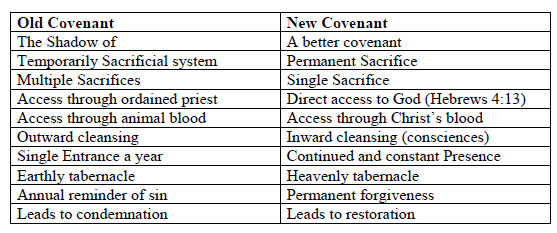Contributor: Wale Abiona
INTRODUCTION
From the previous lesson, titled “A Better Covenant”, the superiority of Christ position and location (Our High Priest, seated at the right hand of the throne of the Majesty) was made clear. Even clearer was the fact that while somethings are generally good, others are simply better. And that is what we will be looking at today, old versus new.
Obsolete means old, unfit, outdated.
Verse 7:
“For if that first covenant had been faultless, then no place would have been sought for a second.”
Flashback
Genesis 3:7, 21
Their inner eyes became closed and their physical eyes became open. So, what they could only come up with as covering for their now naked body was fig leaves.
Since then, God’s plan was to empower man to be able to correct their own error
Verse 8:
“Because finding fault with them, He says: “Behold, the days are coming, says the LORD, when I will make a new covenant with the house of Israel and with the house of Judah”
Man continued to fall into divers kinds of errors, with the enemy taking advantage.
So God made a promise with a selected few, Abraham’s generation, hoping to use them as a specimen that will provoke the rest of mankind to forsake their way and seek Him.
He made a special promise to them (a good deal or what we would call treaty in today’s world between 2 or more nations)
A quick look into the promise in Genesis 12:1-3
We saw Abraham move from Ur until he finally arrived at the Promise Land. Abraham had some concerns, fears and worries around the promise because of her wife’s barrenness, which made God sentence his seed into 400 years of slavery. But in Genesis 17:1-3 we saw exactly what God expected from Abraham unwavering trust. Series of rules and standards were given as a checklist. Yet this checklist could not prevent them from sinning.
Verse 9:
“not according to the covenant that I made with their fathers in the day when I took them by the hand to lead them out of the land of Egypt; because they did not continue in My covenant, and I disregarded them, says the LORD.”
Now because of His promise and covenant, which expresses God’s own faithfulness to His Word, He delivered them out of Egypt, and performed many wonders in their sight throughout their wilderness journey, hoping they will remember His special love for them, but they complained still. He gave them a new set of rules to guide them and added some
practice by which they can be cleansed if they accidentally fall into error. Exodus 20 to Leviticus
Verse 10:
“For this is the covenant that I will make with the house of Israel after those days, says the LORD: I will put My laws in their mind and write them on their hearts; and I will be their God, and they shall be My people.”
The laws will no longer be written on a tablet for them but will be in their mind and printed in their heart.
Relationship between the mind and the heart.
- The mind is connected to our senses
- The heart keeps the soul alive
See Proverbs 2:10, Psalms 1:2, Joshua 1:8
Verses 11-12
“11 None of them shall teach his neighbor, and none his brother, saying, ‘Know the LORD,’ for all shall know Me, from the least of them to the greatest of them. 12 For I will be merciful to their unrighteousness, and their sins and their lawless deeds I will remember no more.”
The implications of these verses is that
• Nobody will need to be taught to avoid sin
• Believers will be in pure and constant fellowship with God.
• We will abide in perfect love, our past will be forgiven
• We will experience God's love in our lives and share it with others without fear1 John 4:18
• The future punishment that awaits those who do not believe does not concern the abiding believer.
Verse 13:
“In that He says, “A new covenant,” He has made the first obsolete. Now what is becoming obsolete and growing old is ready to vanish away.”
The Old Covenant was the “working arrangement” that God had with Israel. He had chosen them for a special relationship that He did not have with any other group of people on earth. He took just a few patriarchs (Abraham, Isaac, Jacob) and grew their descendants into a great nation and gave them a land (Canaan) and His law to live by (see Exodus 20 and following). The Israelites were to remain loyal to God, obeying Him and worshipping Him alone. If they did, He promised to bless them, and if they did not, He promised they would be chastened (see Deuteronomy 27—28).


In this new covenant, God said, Israel will be restored, sins will be finally forgiven, people will know God directly, and they will have His law written on their hearts so that they will want to obey Him.
Romans 11:11, Acts 15:14–18:
Another aspect of the New Covenant is that Gentiles can be “grafted into the tree of Israel” by faith in Jesus, the King and Messiah of Israel.
CONCLUSION
The Old Covenant was governed by a law that prescribed to correct behavior and that the people continually broke. It contained a sacrificial system that only temporarily removed sins. The sacrifices were administered by priests who represented the people of Israel to God, but the people could not enter God’s presence themselves.
The New Covenant is governed by a law that is internalized by the people of God and energized by His Spirit. The sins of the people are forgiven and removed once and for all by the sacrifice of Jesus Christ, and the people of God have direct, intimate access to Him.
Finally, Gentiles who believe are included in the New Covenant.









